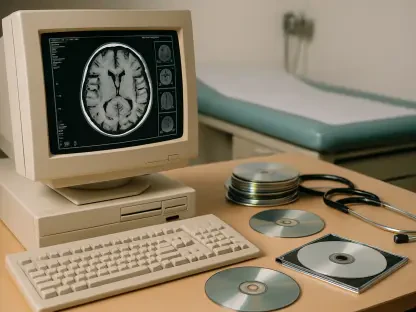The fast-paced evolution of artificial intelligence has made significant strides in revolutionizing various sectors, particularly healthcare logistics. Clarium, an AI-driven supply chain startup backed by Kaiser Permanente’s venture arm, stands at the forefront of this transformational wave. With healthcare spending ballooning due to inefficiencies and supply chain disruptions exacerbated by natural events and geopolitical shifts, the need for AI-assisted optimization in healthcare logistics has never been more pressing.
A New Era in Healthcare Logistics
Artificial intelligence has become a critical lifeline for healthcare supply chains vulnerable to unforeseen disruptions. Clarium has emerged as a pivotal player, harnessing AI to provide solutions that address the persistent inefficiencies experienced in healthcare logistics. Established as a response to a growing crisis, Clarium automates supply chain tasks, providing robust inventory management systems to hospitals grappling with unpredictable supply shortages.
The significance of Kaiser Permanente’s investment in Clarium underscores the urgency of adopting advanced technologies that enhance supply chain resiliency. As the healthcare sector grapples with the ramifications of natural disasters and geopolitical tensions, AI-driven systems offer an innovative solution by predicting disruptions and enabling health systems to adapt proactively.
Key Features and Performance of Clarium’s AI Technology
Optimization Through Advanced Algorithms
Clarium applies sophisticated AI algorithms that optimize supply chain operations by analyzing large datasets to streamline processes and mitigate inefficiencies. This optimization includes features that predict and prevent supply shortages, thus safeguarding the operational flow within healthcare facilities. By interpreting vast amounts of data efficiently, Clarium helps minimize overspending caused by slow, error-prone traditional methods.
Predictive Analytics in Inventory Management
Another pillar of Clarium’s technology is its predictive analytics capability, a powerful tool in inventory management and supply chain resilience. These analytics evaluate weather, geopolitical contexts, and current events to anticipate disruptions and offer alternative sourcing solutions. Such anticipatory measures ensure hospitals can maintain an uninterrupted supply of critical medical provisions, thereby enhancing their operational readiness during crises.
Recent Advancements and Adoption Trends
Recent developments within Clarium’s platform reflect a shift toward integrating smarter technologies into healthcare logistics. Innovations include AI-driven forecasting tools that have gained traction among healthcare providers recognizing the value of predictive analytics. The partnership between Clarium and prominent health systems such as Yale New Haven Health and Kaiser Permanente indicates an industry-wide move toward adopting these technologies for greater efficiency and reliability in supply handling.
As AI adoption accelerates, the sector is witnessing transformative effects, with providers increasingly prioritizing technologies that promise greater resilience against disruptions. Kaiser Permanente’s investment highlights both the commitment to this trend and the potential future widespread adoption of AI solutions.
Real-World Implementations in the Healthcare Sector
The AI-driven systems developed by Clarium have begun making tangible impacts across various healthcare environments, demonstrating practical applications and benefits. Hospitals like Geisinger and Boston Children’s Hospital incorporate Clarium’s technology to optimize their supply chain operations, leading to improved efficiency and reliability. These implementations reduce costs and enhance hospitals’ ability to respond to supply needs in real-time, significantly improving patient care.
Moreover, the broader implications for health system planning and preparedness are substantial. By leveraging AI technology, healthcare providers can better allocate resources and manage risks, thereby improving overall service delivery quality.
Challenges and Limitations Facing AI-Driven Supply Chains
Despite its promise, AI-driven healthcare logistics face several obstacles. Technical complexities, regulatory hurdles, and market dynamics pose significant challenges requiring ongoing research and innovation to address. Some systems struggle with data integration or encounter resistance from stakeholders unacquainted with AI technologies. These issues underscore the need for comprehensive strategies to overcome barriers, ensuring successful and secure implementation.
Efforts are underway to refine AI-driven systems, enhance interoperability with existing infrastructures, and ensure regulatory compliance. Continued progress in these areas will be crucial for the full deployment of AI technologies in healthcare supply chains.
Future Considerations and Pathways Forward
Looking beyond present capabilities, the future trajectory of AI in healthcare logistics holds significant promise for expansive improvements. Potential breakthroughs in AI methods could revolutionize supply chain management, introducing new efficiencies and cost-saving measures. As technology evolves, healthcare systems must remain adaptable, continuously evaluating and integrating advancements to keep pace with emerging trends.
On the horizon, AI could facilitate innovations in predictive capabilities, risk management, and resource allocation strategies, transforming how healthcare systems operate amidst dynamic global pressures. Active engagement in these developments will be essential for healthcare entities striving to enhance service delivery standards.
Final Thoughts on Clarium’s Impact
As AI continues to shape healthcare logistics, it provides promising solutions for addressing longstanding inefficiencies and unpredictabilities. Kaiser’s investment in Clarium represents more than just a strategic move—it embodies a broader trend within the sector toward innovation-driven transformation. Evaluating Clarium’s current capabilities suggests that AI technology’s expansion into healthcare supply networks will likely yield substantial benefits in resiliency and efficiency, advancing healthcare systems’ ability to overcome emerging challenges.









